Prebiotics are non-digestible fibers and compounds that promote a healthy gut microbiome by nourishing beneficial bacteria. Basically, they are the food for probiotics. These fibers may help support digestion, enhance immune function, and improve overall health. (1)
Given the increasing interest in gut health, the market is flooded with prebiotic and probiotic supplements. To arm you with the information you need to select the right prebiotic for your health and wellness needs, our team of health experts tested dozens of supplements to identify the best options available. We considered ingredient quality, efficacy, safety, customer experience, and more to identify the eight best prebiotic supplements.
Editor’s choice: Onnit Total Gut Health
Our editor’s choice is Onnit Total Gut Health, which is chosen for its comprehensive formula that includes a potent blend of prebiotics, probiotics, and digestive enzymes. This supplement stood out for its high-quality ingredients, impressive efficacy, and excellent user reviews. Read on for full details and our testing notes to understand why Onnit Total Gut Health is our top pick for optimal digestive health.
Medical disclaimer: This article is intended for educational and informational purposes only. It is not intended as a substitute for medical advice. For health advice, contact a licensed healthcare provider.
Our picks for the best prebiotics
- Best probiotic combination: Onnit Total Gut Health
- Best for constipation: Transparent Labs Prebiotic Greens
- Best for weight loss: ColonBroom Premium
- Best for diabetes: Hlth Code Berberine
- Best for women: Legion Athletics Balance
- Best powder: Nutricost Organic Inulin Powder
- Best for gut health: Naked Nutrition Naked Gut
- Best for men: Gainful Oat Bran Fiber
Compare prebiotic supplements
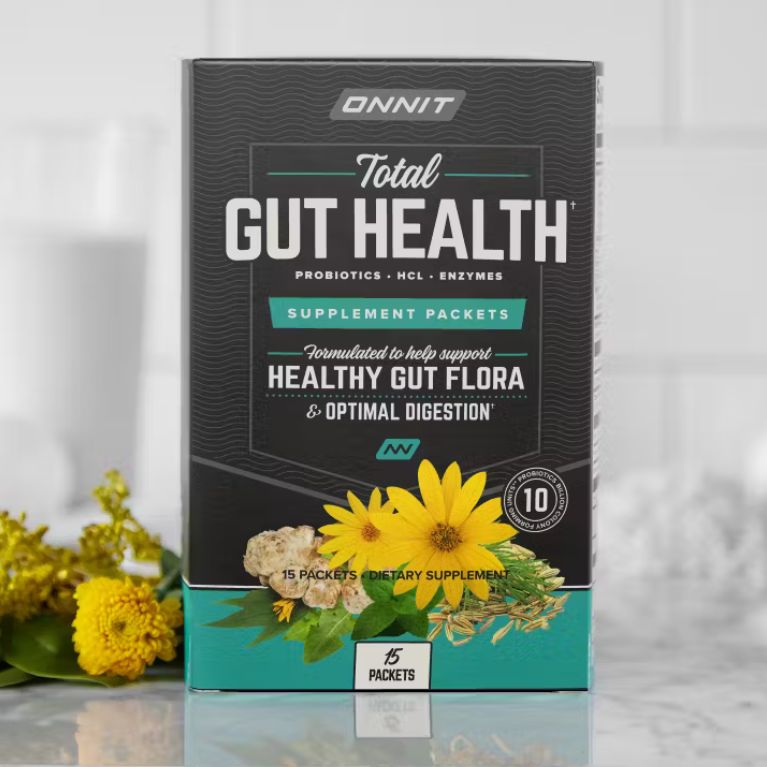
|
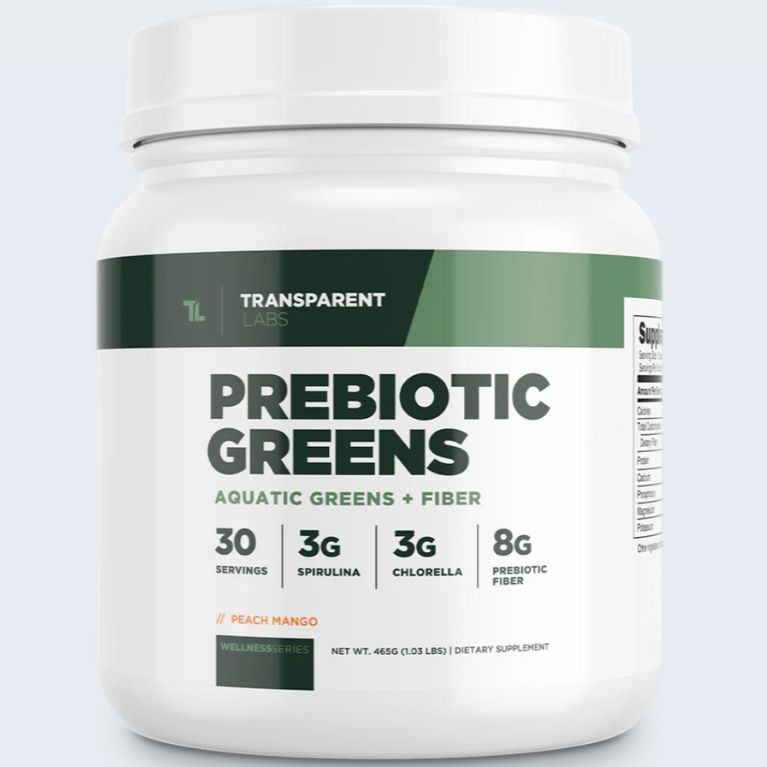
|
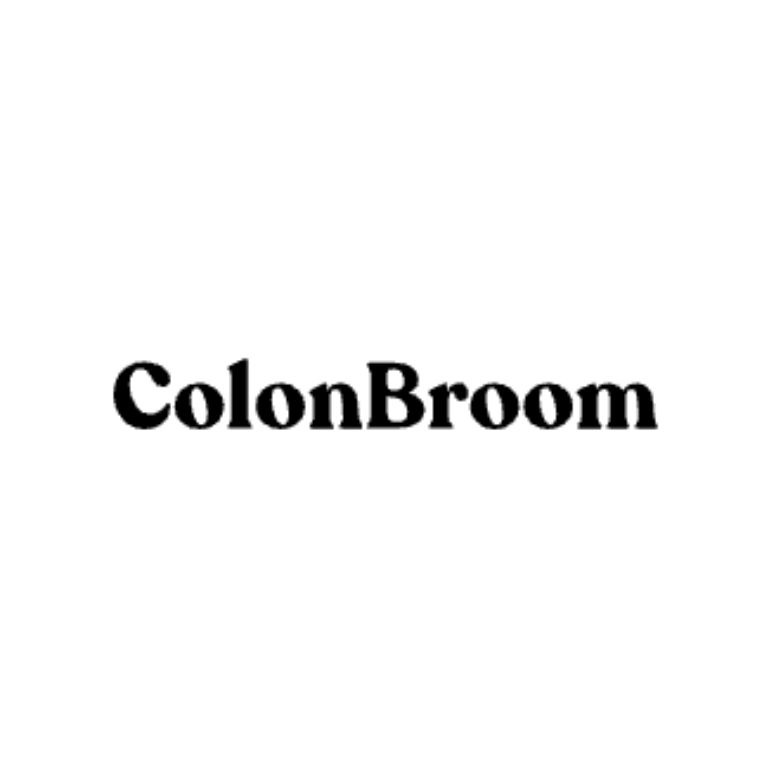
|
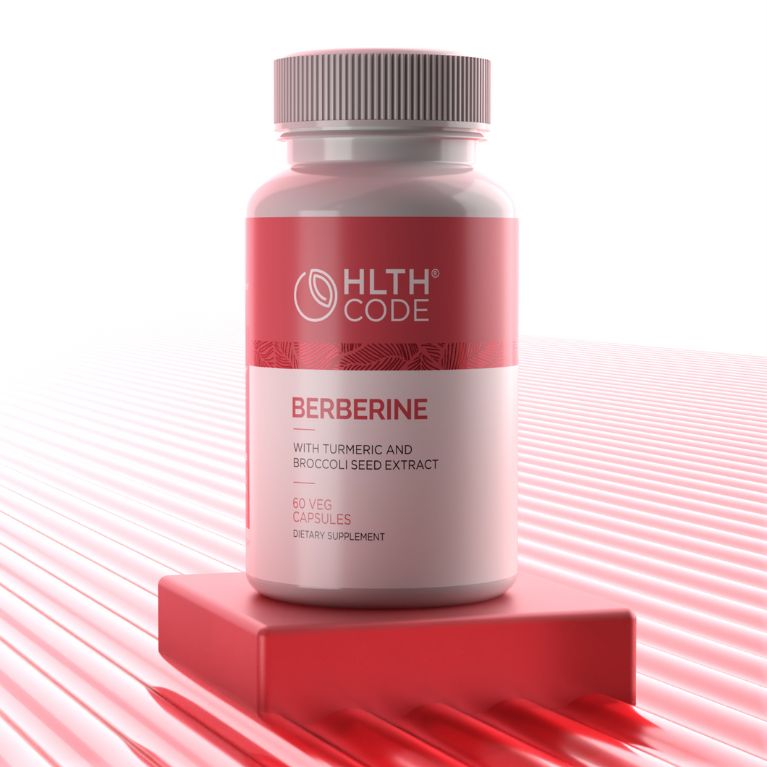
|
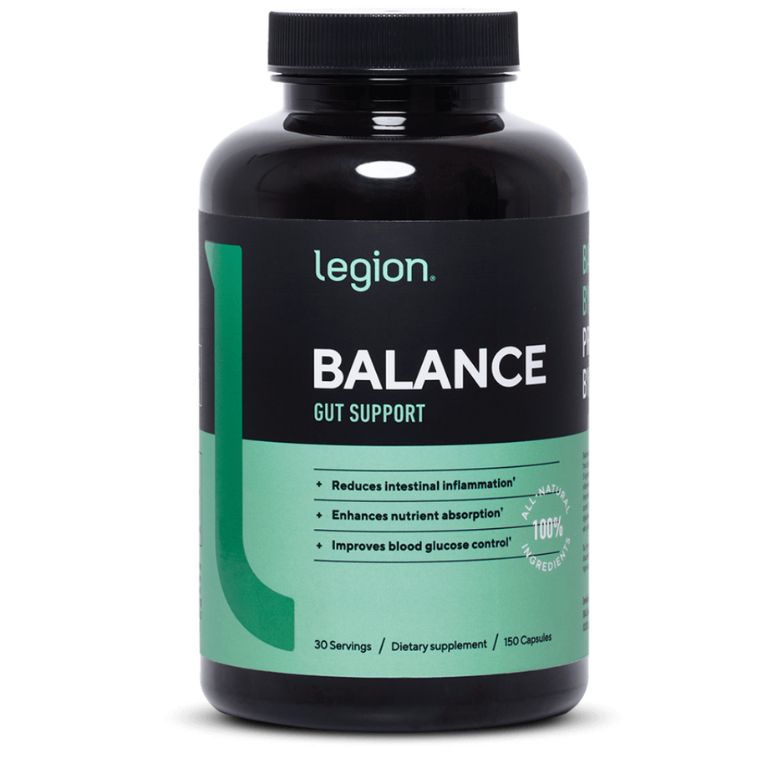
|
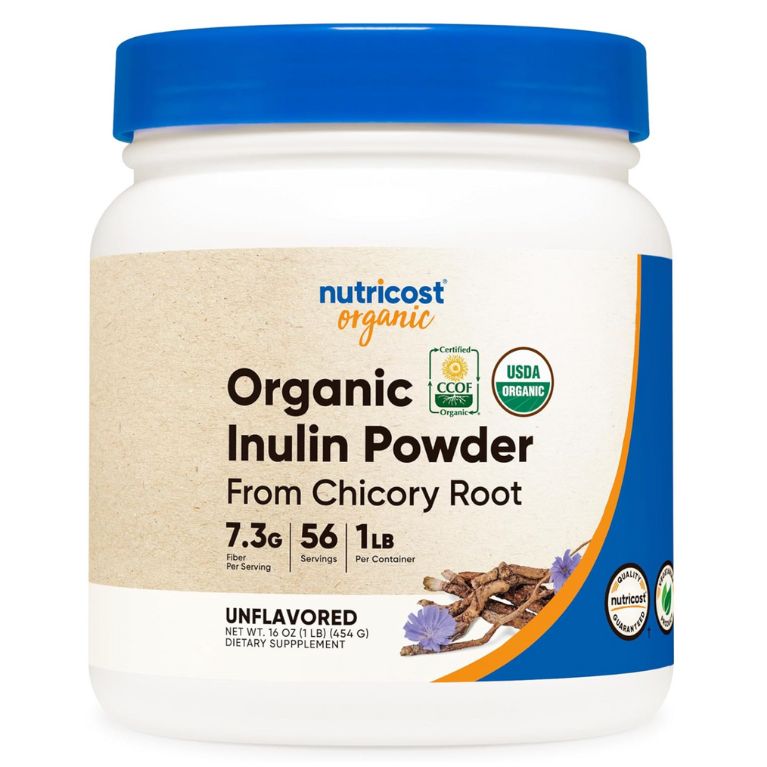
|
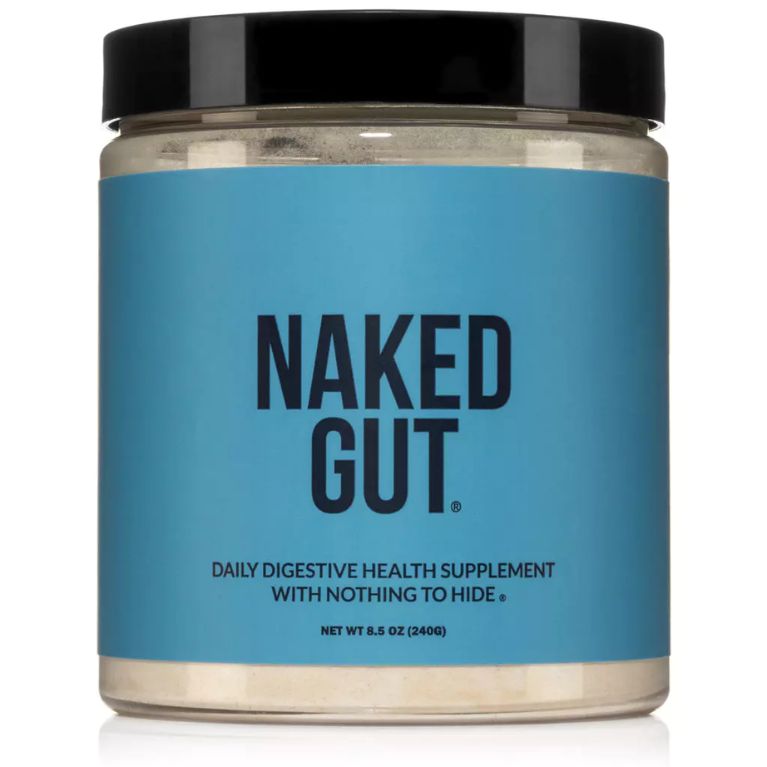
|
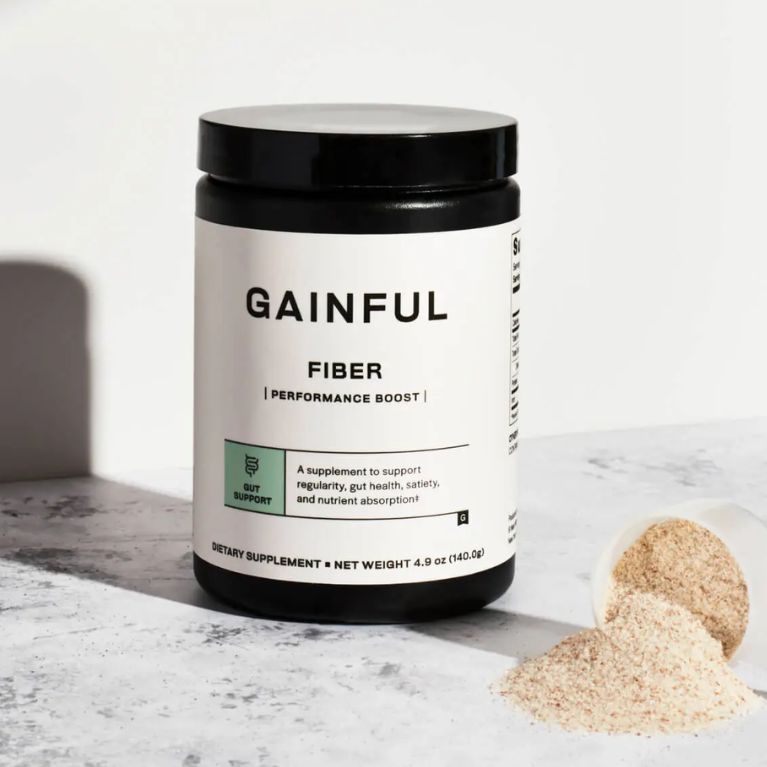
|
|
| Onnit Total Gut Health | Transparent Labs Prebiotic Greens | ColonBroom Premium | Hlth Code Berberine | Legion Athletics Balance | Nutricost Organic Inulin Powder | Naked Nutrition Naked Gut | Gainful Oat Bran Fiber | |
| Rating | ||||||||
| Type of prebiotic | Organic Jerusalem artichoke, organic dandelion root | Organic acacia fiber, Jerusalem artichoke fiber, chicory root | Psyllium seed husk powder | Berberine HCl, broccoli seed extract, turmeric root powder | Berberine, artichoke leaf | Organic chicory root inulin | Acacia, citrus pectin, IXOS™, inulin | Oat bran |
| Form | Capsules | Powder | Powder | Capsules | Capsules | Powder | Powder | Powder |
| Dosage | 7 capsule | 1 scoop | 1 scoop | 2 capsules | 5 capsules | 1 scoop | 1 scoop | 1 scoop |
Best prebiotic and probiotic combination: Onnit Total Gut Health
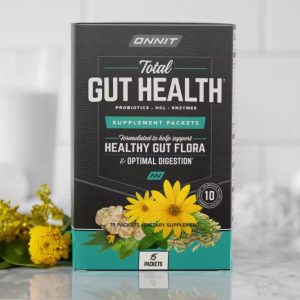

Key product features
What you should know
Onnit Total Gut Health is an all-in-one supplement designed to enhance digestive health and overall gut function. It contains a blend of high-quality prebiotics, probiotics, digestive enzymes, and betaine hydrochloride (HCl).
- Onnit Total Gut Health comes in a pre-packed assortment of five supplements. Our product tester noted that they’re about the size of a quarter and easy to swallow.
- While Onnit is by far the most expensive prebiotic supplement we have featured, we think the five-in-one formula is worth it. A serving costs $2.53, which is much higher than average for a prebiotic.
- Individuals seeking a pre-and probiotic to support overall digestive health and wellness will appreciate Onnit’s comprehensive formula.
Why we like Onnit Total Gut Health as best probiotic combination
This five-in-one supplement delivers potent probiotics with its blend of organic Jerusalem artichoke, organic dandelion root, Saccharomyces boulardii, HCl, and a mix of probiotic strains, including L. acidophilus DDS-1, L. plantarum, L. rhamnosus, B. infantis, and B. lactis.
The organic Jerusalem artichoke and dandelion root in this formula provide a rich source of prebiotic fibers, fueling the growth of healthy gut bacteria. (2) S. Boulardii is a unique probiotic yeast that supports digestive health and helps maintain balance in the gut microbiota. (3) The HCl capsule aids digestion by supporting stomach acid production, which is crucial for breaking down food and absorbing nutrients. (4)
Onnit’s probiotic formula boasts 10 billion CFUs derived from five extensively researched strains. Lactobacillus acidophilus DDS-1 is recognized for its role in bolstering digestive and immune health. (5) L. plantarum contributes to improving overall digestive function. (6) L. rhamnosus and Bifidobacterium infantis may assist in alleviating diarrhea and IBS symptoms. (7) B. lactis aids in digestion and may help mitigate lactose intolerance symptoms. (8)
A one-month supply of Onnit costs $2.53 per serving, placing it on the higher end of the price spectrum for prebiotic supplements. However, this cost might be justified when considering that Onnit’s comprehensive formula could potentially replace the need for additional supplements, offering a range of benefits in a single product. Despite this, the lack of third-party testing is a notable drawback, especially at this price point, as independent verification would provide extra assurance of the product’s quality and efficacy.
For more insights, check out our complete Onnit Total Gut Health review.
What customers are saying
Onnit Total Gut Health has received 327 global ratings on Amazon, most of which are positive. Customers regularly comment on this supplement’s effectiveness and the convenience of the individual supplement packs.
“Product works great; could not be happier,” verified Amazon customer with the username “CJ” wrote.
“These supplements helped maintain a good balance when traveling out of the country.”
Therese L., Amazon
However, some users noted stomach pain and discomfort when starting these supplements.
For example, verified Amazon customer Lance Logan Shuck wrote, “This product gave me serious stomach problems after just one use.”
Specs
| Key ingredients | Organic Jerusalem artichoke, organic dandelion root, 5 strains of probiotics, S. Boulardii, betaine hydrochloride |
| Serving size | 1 packet (7 capsules) per day |
| Number of servings | 15-30 |
| Cost per serving | $2.53 |
| Third-party testing | N/A |
Best prebiotic for constipation: Transparent Labs Prebiotic Greens
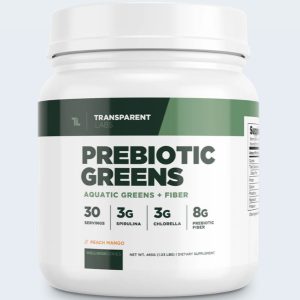

Key product features
What you should know
Transparent Labs Prebiotic Greens feature a powerful blend of organic fibers and greens that support digestive health. True to its name, Transparent Labs sets itself apart with third-party testing, label transparency, and clinically dosed, all-natural ingredients.
- Our product tester found this powder challenging to handle and mix. It didn’t dissolve well with just a spoon, and she didn’t enjoy the stevia aftertaste in the peach mango flavor.
- At $1.53 per serving, Transparent Labs Prebiotic Greens is comparable to the average prebiotic on the market.
- This supplement is best for individuals seeking a natural and effective way to support their overall digestive health that may alleviate constipation.
Why we like Transparent Labs Prebiotic Greens as best for constipation
Transparent Labs Prebiotic Greens stand out as the best prebiotic for constipation due to its potent blend of prebiotic fibers and greens in clinically supported dosages. Available in flavors such as peach mango, original, and pineapple coconut, this supplement supports digestive health and regularity, making it an excellent choice for those struggling with constipation.
One of the key ingredients is organic acacia fiber, which is included in a dose of 3000 mg per serving. Acacia fiber is known for its gentle digestion support and ability to promote regular bowel movements. This fiber works by feeding beneficial gut bacteria, which may help soften stools and ease constipation. (9) Alongside acacia fiber, the supplement also contains 1000 mg each of Jerusalem artichoke fiber and chicory root, both known for their prebiotic properties. These fibers nourish the gut microbiome, fostering an environment that supports regular digestion. (2,10)
The supplement also includes 3000 mg of organic spirulina and 3000 mg of organic chlorella. Spirulina is a nutrient-dense algae that provides essential vitamins and proteins, supporting overall energy levels and immune function. (11) Chlorella, known for its detoxifying properties, aids in digestive health by enhancing the body’s ability to eliminate waste and toxins. These ingredients contribute to a holistic approach to digestive health, ensuring that the gut is well-supported and functioning optimally. (12)
Our expert product tester, Ellie Baldini, followed the label instructions and mixed one scoop of the Prebiotic Greens with eight ounces of water. The powder was frustrating to handle, as it spilled everywhere while trying to fish out the scoop. Because of its deep green color, it stained her white table and hands.
Taste-wise, Ellie found the peach mango flavor pretty unpleasant. She noted the stevia left a noticeable aftertaste that overpowered the fruit flavor and did not pair well with the grassy taste you’d typically expect from a greens powder.
Transparent Labs Prebiotic Greens are free from artificial sweeteners and colors, gluten-free, and non-GMO, aligning with the company’s commitment to clean and transparent nutrition. Each serving contains 44 calories, seven grams of carbohydrates, six grams of fiber, and four grams of protein.
At $1.53 per serving, Transparent Labs Prebiotic Greens are reasonably priced compared to other greens powders, offering good value for its high-quality ingredients and effective third-party tested formulation. The option to subscribe and save 10%, along with free shipping, adds to its affordability.
Specs
| Key ingredients | Organic spirulina, organic chlorella, organic acacia fiber, Jerusalem artichoke fiber, chicory root |
| Serving size | 1 scoop |
| Number of servings | 30 |
| Cost per serving | $1.53 |
| Third-party testing | Yes |
Best prebiotic for weight loss: ColonBroom Premium
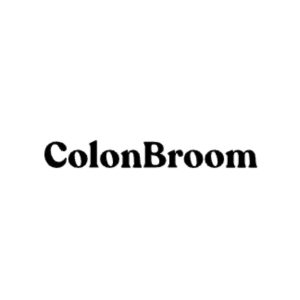

Key product features
What you should know
ColonBroom Premium’s blend of psyllium husk, L-carnitine tartrate, and Capsimax® Cayenne fruit extract may promote digestive health.
- Our product tester found that ColonBroom mixes and tastes better than a typical psyllium husk powder.
- At $1.42 per serving, ColonBroom is about the average price for a prebiotic supplement. However, our product tester noted that premium psyllium husk powders are typically priced at $0.75 per serving.
- Our expert product tester recommends ColonBroom for individuals who need to consume more fiber but experience gastrointestinal distress when eating common high-fiber foods.
Why we like ColonBroom Premium as best for weight loss
If you’re on a weight loss journey and seeking a prebiotic supplement to support your goals, ColonBroom Premium might be a valuable addition to your regimen. This product is specifically formulated to help manage weight, control appetite and reduce bloating with ingredients like psyllium seed husk powder, L-carnitine tartrate, and cayenne fruit extract. One scoop provides 20 calories and four grams of fiber, contributing to a balanced diet without adding a significant caloric load.
The key ingredients in ColonBroom Premium each offer specific health benefits. The psyllium seed husk powder, at 3.6 grams per serving, is a powerful source of soluble fiber. It absorbs water and forms a gel-like substance in the gut, promoting a feeling of fullness that can help control appetite and reduce overall calorie intake. Additionally, psyllium husk supports healthy digestion and can alleviate bloating by regulating bowel movements. (13)
Our expert product tester, Rachael Harris, pointed out that it’s important to drink ColonBroom quickly after mixing it because the psyllium husk settles to the bottom of the glass and turns into an off-putting jelly texture. You want this effect to occur in your gut, not your glass!
L-carnitine tartrate, included at 1 gram per serving, is known for its role in fatty acid metabolism. It helps transport fatty acids into the mitochondria, which can be burned for energy, potentially enhancing fat loss and improving exercise performance. (14) L-carnitine is also a great fatigue reducer, notes Victoria Burgess, Ph.D., CSCS, CISSN.
ColonBroom Premium also features Capsimax® Cayenne fruit extract at 50 grams per serving. Capsimax® is a concentrated form of capsaicin, the active component in chili peppers, which is known for its thermogenic properties. In other words, it may increase metabolic rate, promote fat oxidation, and facilitate weight loss. (15) The supplement is further enhanced with a high dose of chromium (571% of the daily value), which is crucial in regulating blood sugar levels and reducing cravings. (16) Sweetened with stevia, ColonBroom Premium is gluten-free, non-GMO, and vegan, making it suitable for various dietary preferences.
I had a frustrating user experience on the website. Obtaining detailed pricing information required completing a 13-question quiz and providing an email address. Also, the price point might seem high at $84.99, but since you’re getting 60 servings per container, each serving costs $1.42. This is about average for a prebiotic supplement but much more expensive than a plain psyllium husk supplement.
Check out our full ColonBroom review for more information.
What customers are saying
On Amazon, ColonBroom Premium has earned 128 global ratings. Customers like the strawberry flavor, but reviews on the supplement’s effectiveness are mixed.
For example, verified Amazon buyer Katie Castro wrote, “I often feel hungry throughout the day between meals. Drinking this in the morning helps me feel fuller. It tastes good, too!”
“Love this,” wrote verified Amazon customer Troy A. Young. “The flavor tastes like strawberry lemonade, no funny aftertaste“
However, an Amazon customer named Margaret noted ColonBroom didn’t work for her. “I have been using this every day for months and haven’t lost a pound (with exercising).”
Specs
| Key ingredients | Psyllium seed husk powder, L-carnitine tartrate, Capsimax® Cayenne fruit extract, chromium |
| Serving size | 1 scoop |
| Number of servings | 60 |
| Cost per serving | $1.42 |
| Third-party testing | N/A |
Best prebiotic for diabetes: Hlth Code Berberine
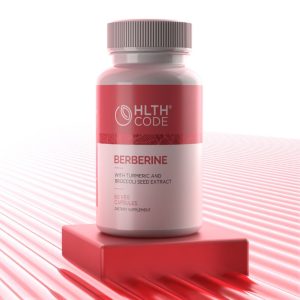

Key product features
What you should know
Hlth Code Berberine is formulated with berberine HCl, broccoli seed extract, and turmeric root powder, which may naturally support blood sugar regulation and metabolic health.
- Berberine is as effective as some anti-diabetic drugs at reducing blood sugar levels. This formula contains 800 milligrams of berberine HCl.
- A 30-day supply of Hlth Code Berberine costs $1.33, about average for a prebiotic supplement.
- This supplement is ideal for individuals seeking a natural supplement to support healthy blood sugar levels and manage diabetes.
Why we like Hlth Code Berberine as best for diabetes
For individuals managing diabetes, finding effective supplements to support healthy blood sugar levels is crucial. Hlth Code Berberine is a top choice for this purpose, offering a well-rounded formula designed to aid in glucose metabolism, weight management, and overall health.
The primary ingredient, berberine HCl, is known for its ability to lower blood sugar levels. It works by activating an enzyme called AMPK (adenosine monophosphate-activated protein kinase), which regulates metabolism. Research has shown that berberine can help improve insulin sensitivity, reduce glucose production in the liver, and enhance glucose uptake by cells, making it highly effective for diabetes management. (17)
Hlth Code Berberine also includes 250 mg of broccoli seed extract per serving. Broccoli seed extract is rich in sulforaphane, a compound that supports detoxification, reduces inflammation, and improves insulin resistance. These benefits are particularly valuable for individuals with diabetes, as chronic inflammation and poor insulin sensitivity are common challenges associated with the condition. (18)
Including 200 mg of turmeric root powder further enhances the supplement’s anti-inflammatory properties. Turmeric contains curcumin, a powerful antioxidant that can help reduce inflammation, support healthy cholesterol levels, and improve overall metabolic health. (19)
Hlth Code Berberine is non-GMO, all-natural, gluten-free, and free from artificial colors, flavors, and sweeteners, ensuring a clean and safe supplement for daily use. It’s manufactured in a cGMP-certified and FDA-registered facility, meaning the product adheres to high quality and safety standards.
Priced at $39.95 per bottle ($1.33 per serving), with a subscribe-and-save option reducing the cost by $5 per bottle, Hlth Code Berberine provides a cost-effective solution for those looking to enhance their diabetes management regimen.
Specs
| Key ingredients | Berberine HCl, broccoli seed extract, turmeric root powder |
| Serving size | 2 capsules |
| Number of servings | 30 |
| Cost per serving | $1.33 |
| Third-party testing | Manufactured in a cGMP-certified FDA-registered facility |
Best prebiotic for women: Legion Athletics Balance
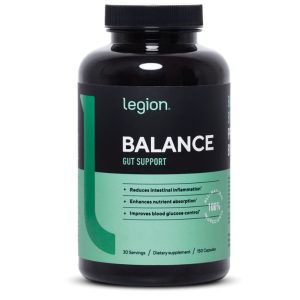

Key product features
What you should know
Legion Balance is formulated with a clinically effective dose of berberine (1500 milligrams) alongside artichoke leaf and digestive enzymes, which may improve blood glucose control, reduce intestinal inflammation, and enhance nutrient absorption.
- We love Legion Athletics because its supplements are lab-tested for purity and have a money-back guarantee—no returns necessary.
- At $1.67 per serving, Legion Athletics Balance is about average for a prebiotic supplement, especially considering the third-party testing and high-quality ingredients.
- Berberine may help improve blood sugar levels, fat metabolism, and other hormonal health outcomes in people with polycystic ovarian syndrome (PCOS).
Why we like Legion Athletics Balance as best for women
This supplement offers a potent blend of natural ingredients, like berberine and artichoke leaf, specifically chosen to enhance women’s health. From hormonal balance to digestive support, Legion Athletics Balance addresses multiple aspects of well-being, making it our top choice for the best prebiotic supplement for women.
A key ingredient in Legion Athletics Balance is berberine, included at a substantial dose of 1500 mg per serving. Berberine is known for its numerous health benefits, including its ability to regulate blood sugar levels, support metabolic health, and promote weight management. For women, these effects are particularly beneficial as they may help manage conditions such as PCOS. (20)
The supplement also features 1800 mg of artichoke leaf extract, known for its positive effects on digestive health and liver function. (21) Bromelain, pepsin, and papain are digestive enzymes supporting gastrointestinal health. These enzymes help break down proteins and improve nutrient absorption, reducing bloating and promoting a healthy digestive system. (22)
One consideration for potential users is that Legion Athletics Balance contains wheat and soy, which may be problematic for those with allergies or sensitivities to these ingredients. We love that the product’s natural formulation is third-party tested in an ISO 17025-accredited lab to ensure high quality and safety standards. Legion also offers a great probiotic supplement for women and men.
What customers are saying
While there aren’t many reviews for Legion Balance on Amazon, they are mostly positive.
“I like the product a lot. It has calmed my stomach and aided in my digestion. I recommend it.”
Logan, Amazon
On the other hand, an Amazon customer named Rebecca didn’t find the supplement effective. “I didn’t see any changes after a whole bottle,” she wrote.
Specs
| Key ingredients | Berberine, artichoke leaf, bromelain, pepsin, papain |
| Serving size | 5 capsules |
| Number of servings | 30 |
| Cost per serving | $1.67 |
| Third-party testing | ISO 17025 accredited lab |
Best prebiotic powder: Nutricost Organic Inulin Powder
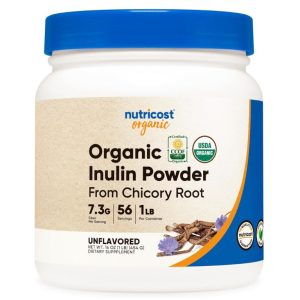

Key product features
What you should know
Nutricost Organic Inulin Powder is a high-fiber supplement formula with just one ingredient – organic chicory root inulin.
- We love Nutricost for its quality-assured supplements, which are manufactured in a GMP-compliant facility. This formula is gluten-free, vegetarian, and non-GMO.
- Nutricost is a budget-friendly option. It costs $0.48 per serving, which is well below the average for a prebiotic supplement.
- This supplement is best for individuals looking for a high-quality organic inulin supplement without all the bells, whistles, or price tags associated with a premium prebiotic.
Why we like Nutricost Organic Inulin Powder as best powder
Nutricost Organic Inulin Powder stands out as the best prebiotic powder because it doubles as a fiber supplement, offering a potent and natural solution for enhancing digestive health. Inulin is a type of soluble fiber that serves as food for beneficial gut bacteria, promoting a healthy microbiome. By fostering the growth of good bacteria, inulin helps improve digestion, boost immune function, and support overall gastrointestinal health. (10) This supplement also features 8100 mg of organic chicory root inulin per serving, a highly effective prebiotic fiber known for its numerous health benefits.
Each serving of Nutricost Organic Inulin Powder contains 10 calories and provides 7.7 grams of carbohydrates, with 7.3 grams of that being fiber. This high fiber content is particularly beneficial for those looking to improve their digestive regularity and reduce symptoms of bloating and constipation. Additionally, inulin has been shown to enhance mineral absorption, particularly calcium, which is crucial for bone health. (23) Inulin also assists in weight loss, regulating sugar levels, and lowering inflammation, Burgess adds.
The unflavored nature of this powder makes it versatile for adding to various foods and beverages, though it is worth noting that it doesn’t dissolve well in cold drinks, which might be a consideration for some users.
Nutricost Organic Inulin Powder is non-GMO, vegetarian, and gluten-free, suitable for various dietary preferences and needs. It is manufactured in a GMP (Good Manufacturing Practice) certified facility, ensuring high quality and safety standards. This commitment to quality is crucial for those who prioritize clean and reliable supplements in their health routines.
In terms of value, Nutricost Organic Inulin Powder is reasonably priced at $26.95 for a container with 56 servings, which is just $0.48 per serving. Additionally, a subscribe and save option offers a 20% discount, making it an even more economical choice for regular users. The product also comes with a 60-day money-back guarantee, providing peace of mind for those trying it for the first time.
What customers are saying
On Amazon, customers regularly leave positive comments about the quality and value of Nutricost Organic Inulin Powder. Reviews are mixed on the solubility.
For example, a verified Amazon customer with the username Honey Bee said it’s the best inulin product they’ve ever tried, and they noticed a difference within two days of taking it.
Amazon customer S.T. noted that it has a slightly sweet taste, but it’s a little hard to stir and has the consistency of corn starch.
Specs
| Key ingredients | Organic chicory root inulin |
| Serving size | 1 scoop |
| Number of servings | 56 |
| Cost per serving | $0.48 |
| Third-party testing | Made in a GMP facility |
Best prebiotic for gut health: Naked Nutrition Naked Gut
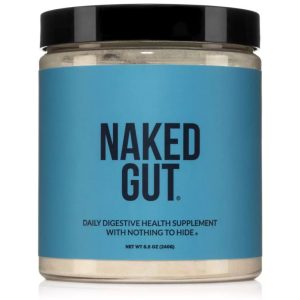

Key product features
What you should know
Naked Nutrition Naked Gut offers daily digestive support with ingredients such as acacia, glutamine, inulin, and 5 billion CFUs of probiotics.
- Naked Nutrition is known for its commitment to clean, transparent labeling and high-quality ingredients. It offers products free from artificial additives, preservatives, and fillers.
- A serving costs $0.62, which is well below the average market price for a prebiotic of this quality.
- Naked Nutrition Naked Gut is best for those seeking a comprehensive gut health supplement combining prebiotics, probiotics, and glutamine in a vegan, GMO-free, and gluten-free formula.
Why we like Naked Nutrition Naked Gut as best for gut health
Naked Nutrition’s Naked Gut stands out as a top choice for those prioritizing gut health. This supplement offers a comprehensive blend of formulated ingredients to support and enhance digestive wellness. It combines prebiotic fibers, probiotics, and other gut-supporting components to create a well-rounded product that addresses various aspects of gastrointestinal health.
The primary prebiotic fibers in Naked Gut include 2000 milligrams of acacia fiber and 1000 milligrams of citrus pectin. Acacia fiber is known for its ability to promote the growth of beneficial gut bacteria, improve bowel regularity, and reduce inflammation in the gut. (9) Citrus pectin, a soluble fiber derived from citrus fruits, has been shown to enhance gut motility and support healthy digestion. (24) The supplement includes 1000 mg of IXOS™ Xylooligosaccharides, a prebiotic that specifically feeds beneficial bacteria in the colon, further promoting a healthy microbiome. (25)
Another standout ingredient is glutamine, which is included in 1,000 milligrams per serving. Glutamine is an amino acid that plays a crucial role in maintaining the integrity of the intestinal lining, potentially preventing issues such as leaky gut syndrome. (26) The addition of 850 milligrams of inulin from Jerusalem artichoke provides an additional source of prebiotic fiber, supporting gut health by fostering the growth of beneficial bacteria and aiding digestion. (2) The formula is rounded out with 100 milligrams of licorice powder, known for its anti-inflammatory and soothing properties, which can help alleviate digestive discomfort. (27)
Naked Gut also includes a robust probiotic blend, delivering 5 billion CFU (colony-forming units) of beneficial bacteria. Probiotics are essential for maintaining a balanced gut microbiome, which is linked to improved digestion, enhanced immune function, and overall health. (28) Including prebiotics and probiotics in this supplement ensures a synergistic effect, promoting a healthy and balanced gut environment.
Naked Gut is vegan, GMO-free, and gluten-free, making it suitable for various dietary preferences and restrictions. Its all-natural ingredient list underscores its commitment to providing a clean and effective product. At $24.99 for 40 servings, with a subscribe and save option that offers a 20% discount, Naked Gut is an affordable and accessible option for those looking to invest in their gut health.
What customers are saying
On Amazon, Naked Nutrition Naked Gut has received 272 global ratings. Customers like the unflavored supplement’s versatility and often comment that it helps with stomach bloating.
“I got this to help with my overall gut health, which has made a huge difference! I’ve been sleeping better, I’m less bloated, and my gut doesn’t feel as heavy.”
Amanda, Amazon
Verified Amazon buyer Terra Lee Waliis wrote, “This stuff is fantastic. Within the first 10 days of taking it, my stomach bloat was almost completely gone. I went from wearing an XL shirt to a size large shirt.”
However, Amazon customer Avery Chipman noted, “The powder smells like a dirty hamster cage and doesn’t taste great in water.”
Specs
| Key ingredients | Acacia, citrus pectin, IXOS™ Xylooligosaccharides, glutamine, inulin, licorice powder, probiotic blend |
| Serving size | 1 scoop |
| Number of servings | 40 |
| Cost per serving | $0.62 |
| Third-party testing | N/A |
Best prebiotic for men: Gainful Oat Bran Fiber
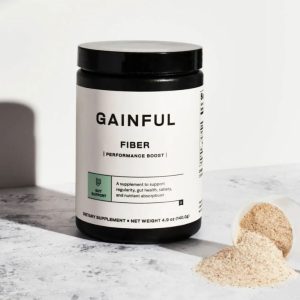

Key product features
What you should know
With 5 grams of fiber in every serving, Gainful Oat Bran Fiber supports satiety, nutrient absorption, regularity, and overall gastrointestinal wellness.
- Gainful has a clean label promise, ensuring the ingredients are all-natural.
- A serving costs $1.57, which is about average for a prebiotic supplement but slightly more expensive than comparable one-ingredient products.
- Gainful Oat Bran Fiber provides high levels of beta-glucan, which supports heart health, cholesterol levels, and digestion, which is particularly important for men’s overall wellness.
Why we like Gainful Oat Bran Fiber as best for men
Gainful Oat Bran Fiber leverages the natural benefits of oat bran to provide a potent source of prebiotic fiber specifically tailored to address men’s unique health needs. With its high beta-glucan content, Gainful Oat Bran Fiber offers a versatile and effective way to boost gut health, manage cholesterol levels, and support overall wellness. (29,30)
Each serving of Gainful Oat Bran Fiber delivers 10 grams of oat bran (avena sativa L), offering 40 calories, 6 grams of carbohydrates, and an impressive 5 grams of fiber. Oat bran is particularly rich in beta-glucan, a type of soluble fiber that has been shown to lower LDL cholesterol levels, reducing the risk of heart disease. This is especially beneficial for men, who are generally at a higher risk for cardiovascular issues. Additionally, the fiber content promotes a healthy digestive system by fostering the growth of beneficial gut bacteria and aiding in regular bowel movements. (31)
At $1.57 per serving, Gainful Oat Bran Fiber is priced slightly above average for a prebiotic supplement with just one ingredient. The clean label promise ensures it’s free from preservatives, artificial flavors, sweeteners, and dyes. However, there is no specific mention of third-party testing.
Specs
| Key ingredients | Oat bran |
| Serving size | 1 scoop |
| Number of servings | 14 |
| Cost per serving | $1.57 |
| Third-party testing | N/A |
How we score prebiotic supplements
Our team thoroughly researched and assessed dozens of prebiotic supplements, evaluating them based on factors such as efficacy, safety, value, and customer experience. We aim to guide you in selecting a prebiotic that meets your health goals and budget. Check out our supplements testing methodology for more details.
Efficacy—40%
Efficacy means the effectiveness of the product in achieving its claims and the evidence that supports those claims. Each supplement can help consumers achieve specific health benefits. We examine whether a supplement delivers on its promised benefits.
Here’s what we look for:
- Clinical evidence
- Calories per serving
- Dose
- Mixability
Safety and side effects—35%
When choosing a supplement, you have to assess health risks, adverse effects, and safety profiles. We ensure the safety of these products through first-hand testing. To do this, we evaluate:
- Reported side effects
- Current research
- Third-party testing
- Manufacturer accreditation
- Artificial sweeteners
- Added ingredients like caffeine
Value—20%
We know that value doesn’t just mean price—it also includes the quality you get for the price. Our team factors in a cost analysis to determine the true worth of a supplement in relation to its price. We then identify products that offer a solid return on investment:
Our factors in this rating include:
- Price per serving
- Quality standards
- Heavy metal testing
Customer experience—5%
A customer’s experience with a company directly impacts satisfaction, loyalty, and the likelihood of repeat purchases. That’s why our team includes it in our testing process.
Our factors in this rating include:
- Ease of purchase
- Shipping and returns
- Customer support
- Subscription service
- 100% satisfaction guarantee
- Multiple forms
Types of prebiotics
There are many types of prebiotics, the most common being fructo-oligosaccharides (FOS), galacto-oligosaccharides (GOS), and trans-galacto-oligosaccharides (TOS). Resistant starches, inulin, and pectin are the most common food sources where these prebiotics are found. (32)
Resistant Starch
Resistant starch is a type of carbohydrate that resists digestion in the small intestine and ferments in the large intestine, acting as a prebiotic. It is found in foods like green bananas, cooked and cooled potatoes, and legumes. This fermentation process promotes the growth of beneficial gut bacteria, such as Bifidobacteria and Lactobacilli. Resistant starch helps improve digestion, increase satiety, and regulate blood sugar levels, making it a valuable prebiotic for overall gut health. (33)
Inulin
Inulin is a soluble fiber in many plants, with high concentrations in chicory root, garlic, onions, and Jerusalem artichokes. As a prebiotic, inulin feeds beneficial bacteria in the gut, particularly Bifidobacteria. It helps improve digestive health by promoting regular bowel movements and reducing constipation. Inulin also enhances mineral absorption, particularly calcium, which supports bone health. This prebiotic is often used in dietary supplements and functional foods to boost fiber intake and support a healthy gut microbiome. (34)
Pectin
Pectin is a type of soluble fiber found in the cell walls of fruits, especially apples, citrus fruits, and berries. It acts as a prebiotic by stimulating the growth of beneficial gut bacteria. Pectin helps improve digestion, reduce inflammation, and regulate blood sugar levels. Additionally, it supports the production of short-chain fatty acids (SCFAs) like butyrate, which are important for colon health. Pectin is commonly included in dietary supplements and functional foods to enhance digestive health and provide a source of dietary fiber. (35)
What’s the difference between prebiotics and probiotics?
Prebiotics and probiotics are crucial for maintaining a healthy digestive system but have distinct characteristics and different functions. Prebiotics are non-digestible fibers and compounds that feed the beneficial bacteria already present in the gut. They act as food for these microbes, promoting their growth and activity. Common sources of prebiotics include inulin, fructooligosaccharides (FOS), and galactooligosaccharides (GOS), which are found in foods like garlic, onions, bananas, and whole grains.
On the other hand, probiotics are live beneficial bacteria that are introduced into the digestive system through certain foods and supplements. These microorganisms help replenish and maintain a healthy balance of gut bacteria, essential for good digestion, immune function, and overall health. Probiotics are commonly found in fermented foods such as yogurt, kefir, sauerkraut, and kimchi, as well as in dietary supplements.
FAQs
Can I take a prebiotic and probiotic at the same time?
Yes, you can take a prebiotic and probiotic at the same time. In fact, taking them together can be beneficial as prebiotics provide the food that probiotics need to thrive, enhancing their effectiveness in promoting gut health. This combination is often referred to as a synbiotic.
How long do prebiotics take to work?
Prebiotics can start to work within a few hours to a few days, but noticeable benefits often take a few weeks. The time frame can vary depending on individual digestive health and the specific prebiotic used. Consistent use is key for optimal results.
What is the best time to take prebiotics?
The best time to take prebiotics is typically before meals, allowing them to reach the colon to nourish beneficial gut bacteria. However, there isn’t a strict rule, and you can take them at any time that fits your routine, as long as you’re consistent with your intake. Some prefer taking them in the morning or evening with their probiotic supplement.
Do prebiotics help with weight loss?
Prebiotics can indirectly support weight loss by promoting a healthy gut microbiome, which may aid in metabolic health and appetite regulation. While more research is needed, some studies suggest that prebiotics and probiotics can help reduce body weight and fat mass over time when combined with a healthy diet and lifestyle. However, they are not a magic solution for weight loss and should be part of a comprehensive approach to achieving and maintaining a healthy weight.
Our experts
Victoria Burgess, Ph.D., CSCS, CISSN
Victoria uses her extensive nutrition and performance knowledge every day. She has a Ph.D. in Health and Human Performance from Concordia University Chicago and holds her NSCA CSCS and Certified Sports Nutritionist (CISSN). She’s an adjunct professor in the Human Performance and Nutrition department at Concordia University Chicago and Parker University, where she teaches undergraduate, graduate, and doctoral level courses. She also sits on the advisory board for both the International Society of Sports Nutrition and the National Advisory Council of the First Responder Institute.
Joana Neziri, M.S., NASM-CPT
Joana is a writer, editor, and content strategist focusing on nutrition, fitness, and all things health. After earning a master’s degree in business from the University of North Florida, she began a career in research and digital marketing.
Kelly Uhler
Kelly has a multifaceted background in elder care, health care, and copywriting. She has worked for organizations such as A Place For Mom and Homecare.com, which gave her the opportunity to work closely with families, providing reliable information to help them make informed decisions about their loved one’s health, safety, and quality of life.

Melissa Boufounos, CHN
Fortune Recommends Nutrition Writer
About Author
Melissa Boufounos is a certified holistic nutritionist, nutrition writer, and lifelong athlete in the greater Ottawa, Ontario, Canada area. She specializes in sports nutrition and works with teen hockey players and competitive obstacle course race athletes in her virtual private practice MB Performance Nutrition .
